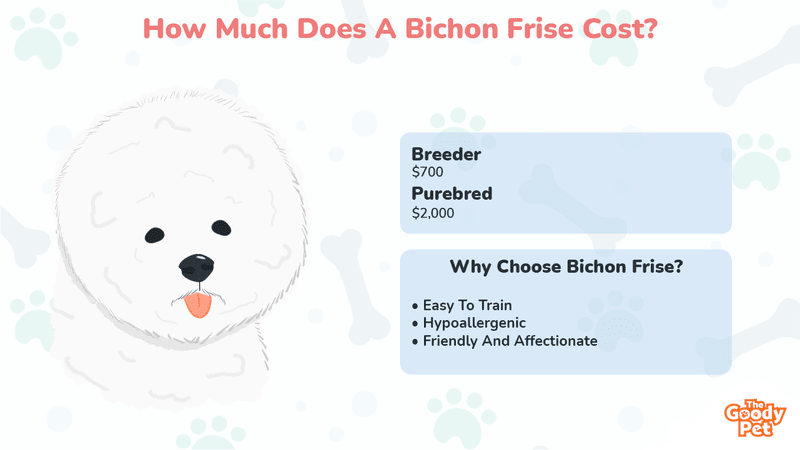The Bichon Frise quickly melts the hearts of dog lovers with its small body clad in a fluffy white coat. It is a hot favorite among many dog owners.
A Bichon Frise costs between $700 to $2,000, which speaks to its popularity. Apart from its physical features, the Bichon Frise is also a healthy and hypoallergenic dog. That translates to lower maintenance, which appeals to many dog owners when considering a canine companion. The price range of a Bichon Frise varies depending mainly on the purity of its genes and the whiteness of its coat.
Why Are Bichons Expensive?
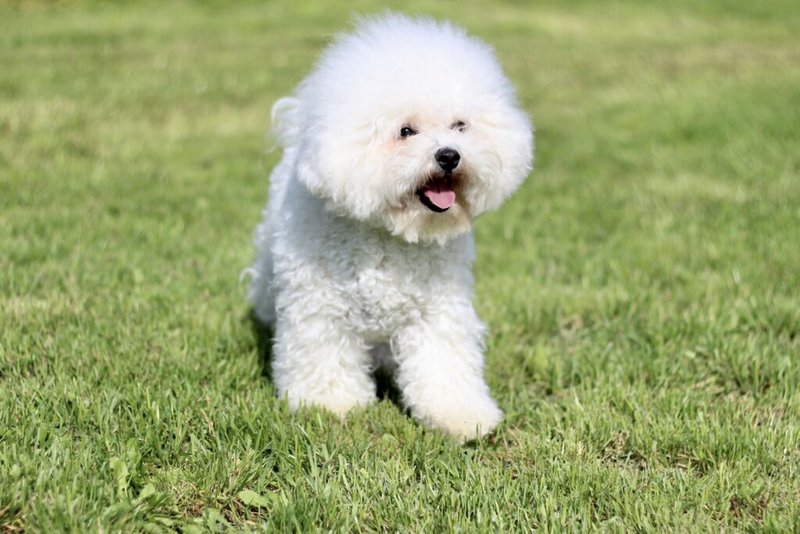
Bichons are one of the more expensive dog breeds. If you buy a young puppy from a reputable breeder, it could cost you $700 or more.
If you want a purebred Bichon Frise with a supreme and competitive bloodline, the price will be significantly higher.
Many people think that Bichon Frises are expensive because of how they look. They are considered to be beautiful dogs, just like Chihuahuas and Yorkies.
The hype, in turn, creates demand for this relatively rare dog breed causing its price to skyrocket.
Bichon Frises are also favored for their hypoallergenic coats. They do not shed a lot or have a lot of dander, making them suitable for people with allergies.
Owning a Bichon Frise can be very expensive. But there are many benefits to owning one. You just need to be prepared to invest the time and effort into training your dog to be the perfect pet.
While the initial purchase price is pretty steep, Bichons are relatively low maintenance. They do not shed a lot, so you only have to invest in grooming maybe once every month or two. They are also generally very healthy dogs who live pretty long, which reduces your vet costs considerably.
If you do not want to spend thousands of dollars for the breed, there are ways you could get a Bichon for cheap.
Adopting a Bichon Frise from a rescue is your best option, whether you get the dog from a previous home or a shelter. There is no guarantee of success in these cases, but it’s worth checking out if you want the dog on a budget.
Are Bichon Frise Good Pets?
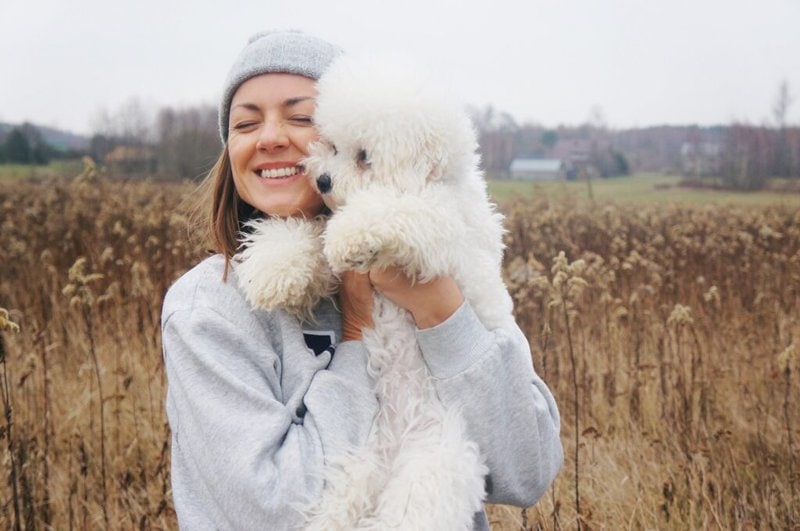
While Bichons may have a bad reputation for being too feisty, they are great pets to have around the house. Here are some of the significant pros and cons of having them as pets in your home.
Why You Might Like A Bichon?
Bichon Frises Are Friendly And Affectionate
Bichons are social animals that will get along with anyone or any other pet. You have to take time to socialize with them. This loving nature makes them ideal family pets because you know they will love you as much as you love them.
Bichons Are Easy To Train
Bichons can be stubborn, but they are intelligent and easy to bribe with treats. So training them should not be too much trouble. In fact, with consistency and the proper techniques, you should have the puppy housebroken in no time.
Bichons Are Hypoallergenic
Bichon Frise does not shed a lot, making it ideal for owners, family members, or guests who are allergic to dog fur or dander.
Why You Might Not Like A Bichon?
Bichon Frises Bark A Lot
Bichons bark a lot, which can be pretty annoying for you and your neighbors. They do this for various reasons, including boredom, anxiety, and even pain. The best way to deal with this is through training and identifying and mitigating the original problem.
Bichons Can Get Aggressive
Bichon Frises are often abandoned at shelters because they can be aggressive. Being aggressive is not their natural behavior, but it is often a reaction to feeling threatened. If you remove the trigger and teach them how to adapt, you should not have any problems.
Why Are Bichons So Needy?
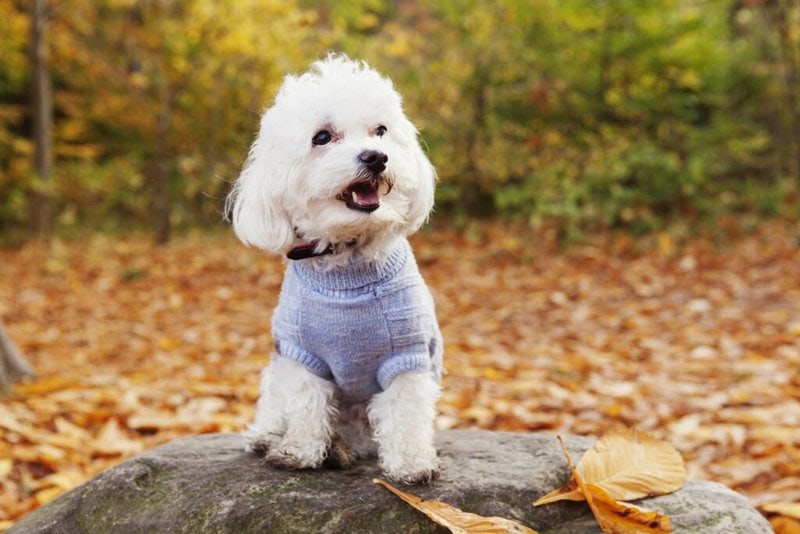
Bichons are known to be very needy. They always want to be near you and follow you around the house. If they’re not close to you, they might throw a fit. The reason is that they have a very affectionate temperament.
Bichons love to cuddle and play with their owners. This behavior is how they show love and how they receive it. So if they follow you around everywhere and seem to want more attention than is reasonable, it is because they are trying to bond with you. A little accommodation here will go a long way.
They are also not very independent. While Bichon Frises can be left alone, they hate it and will often sulk and whine all day long until you come back. Again, this is more about emotional attachment than their inability to take care of themselves.
You can train your Bichon Frise to not be so needy. They will understand that you always come back, as long as you are patient.
Bichons are also prone to anxiety issues and can be traumatized by noises or harsh treatment. But with a calming supplement and some patience, they will get over separation anxiety.
What Health Problems Do Bichon Frise Have?
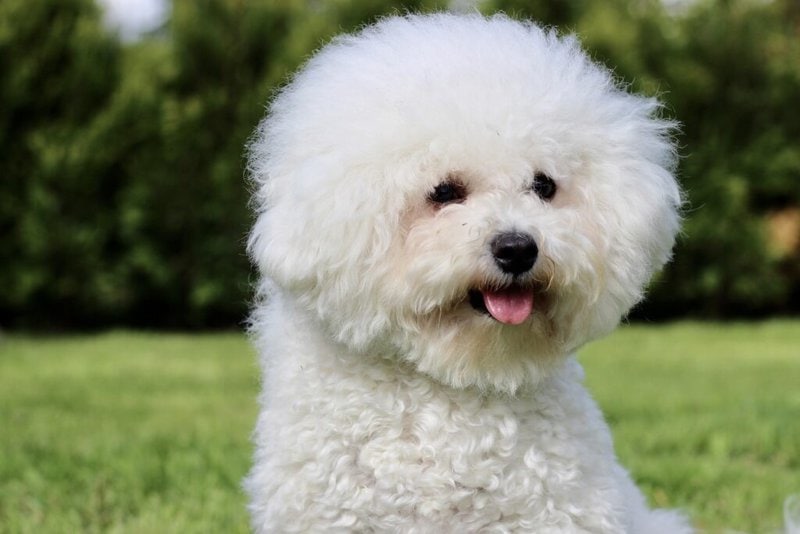
Bichons are a healthy breed of dog, but they can still get sick. Some of the conditions they can get include:
Skeletal Problems
Bichon Frises are prone to developing joint problems. The most common ones are patellar luxation and hip disease. Good nutrition could help prevent or reduce the severity of these conditions.
One option is to provide your Bichon nutrition to nurse their hip and joint problems with specialized dog food like the AvoDerm Natural Advanced Joint Health Dry Dog Food.
Adding dog supplements, like the Doggie Dailies Glucosamine Soft Chews, can be helpful. These supplements have a unique bone and joint health formula that contains elevated amounts of valuable ingredients like glucosamine and chondroitin.
Weight Issues And Metabolic Conditions
These health problems include obesity and diabetes, which are often caused by overeating and eating high-fat foods. It gets worse as people get older and become less active.
They may also be underweight and have conditions like hypoglycemia, often associated with physical and psychological conditions that reduce appetite.
Allergies
Bichons can be allergic to fleas, ticks, pollen, dust, fabrics, and chemicals in grooming products.
Genetic Conditions
These are severe conditions that can often be life-threatening. They include heart malformations and portosystemic shunts. Fortunately, they are not very common and, if caught early enough, can usually be corrected surgically.
Despite all these health issues, Bichons live for 12 to 15 years which is a long time for a dog. The conditions are also rarely deadly. Bichons die from things like cancer and general old age.
Trauma is also a common cause of death, but proper training and vigilance can easily be avoided when letting the dog out.
Are Bichons Hard To Potty Train?
Bichon Frises are intelligent dogs, which makes training them relatively easy. You can use positive reinforcement like good food, hugs, and verbal encouragement to train them. They are also effortless to please, so it’s easy to make them happy.
When training your Bichon, be gentle. These dogs are very emotional and do not respond well to yelling or punishment. If they start to regress or get stubborn, be patient and assert your dominance without being too harsh. Doing this will eventually wear them down, and they will start to do things the right way, especially if the treats are still on offer.
Bichons also have a strong intuition. This helps with potty training, as they work well with schedules. Make sure to establish a routine and stick to it; the dog will learn and even remind you when it’s time to go outside. Training tools like the BLUETREE Potty Training Dog Doorbell can be very effective in housebreaking a Bichon.
Related Questions
Do Bichon Frise sleep a lot? Yes, Bichon Frise can sleep for up to 18 hours a day. As puppies, they are energetic and playful. But as they get older, they become less playful and will sleep for 12 to 14 hours each day.
Do Bichons smell? Yes, they might if they are not groomed properly. The reason is because of their thick coats and skin allergies. If you wash them every week or two, it will help reduce the smell. You can also use a high-quality shampoo like Wahl White Pear Brightening Shampoo for Pets that helps control odor.
How often should you bathe your Bichon Frise? You can bathe them once a week or every other week, but you will need to brush their fur at least 2 to 3 times a week so that it does not get tangled and dirty. Doing this will help to avoid bad smells.

